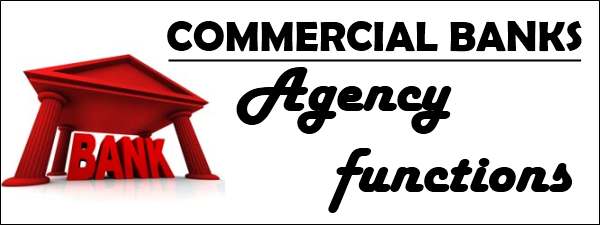Agency functions of Commercial Banks

Agency functions of commercial banks
Agency Services or Agency functions of commercial banks are elaborated in detail below
1. Collection of Cheques, Dividends, Interests etc.: Collecting cheques, drafts, bill of exchange, dividends, interests etc. on behalf of its customers and credit the amount in their account is one of the most important agency services rendered by the banks. Banker accepts standing instructions from the customers and arranges to collect dividend, interest, pension, salaries, bills etc. on behalf of his customers.
2. Payment of Subscription, Rent, Insurance Premium etc.: Banks undertake the payment of subscriptions, rent, insurance premium etc. on behalf of the customers and debit the account with the amount. It accepts the standing instructions of the customer and arranges for.the payment of such expenses on their behalf. It charges a small amount by way of commission for these services.
3. Conduct of Stock Exchange Transactions: Banks purchase and sell various securities such as shares, debentures, bonds etc. of joint stock companies both private and Government on behalf of their customers.
4. Acting as Executor, Trustees, Attorneys etc.: Banks act as executors of will, trustees, attorneys and administrators. As an executor it preserves the “Wills” of the customers and executes them after their death. As a trustee, it takes care of the funds of the customers. As an attorney, it signs transfer forms and documents on behalf of the customer.
5. Preparation of Income Tax Returns: Banks prepare income tax returns for their customers through their tax service departments.
6. Conducting Foreign Exchange Transactions: Commercial banks purchase and sell foreign exchange for their customers.
7. Banker acts as an agent to the customer. When a customer deposits cheques, drafts, bills or any other promissory notes, the banker collects them and on realization credits the account of the customer. For this activity, the banker is given commission. Banks also act as a correspondent, representative of their customers. Some banks may even get the travelers’ tickets, passport etc. for their customers.
8. As the customer has to pay certain periodical payments such as monthly, quarterly, half yearly, the banker is informed by a standing instruction. Thus, club subscription, insurance premium, road tax, electricity charges and telephone bills of the customers are paid by the bank after debiting the customers’ account.
9. As the customer may be a shareholder or debenture holder of companies, he will be receiving dividend warrants and interest warrants, which will be deposited by the customer in the bank. The bank will collect the same and credit it to the account of respective customers.
10. When customers are left with huge amount of money in their account, they can be invested in company securities for capital appreciation or for getting a good return. The banker will be able to advise customers about various investment opportunities as he has the services of experts.
10. When customers die suddenly leaving behind minor children, the court may appoint the banker to act as executor of will. Similarly, in the case of certain companies, the bank may act as trustee for their property in the interest of creditors of the company.
12. In certain business transactions, payments are made with the help of banks by transferring funds to different centres. In the present days, these transfers could be made within few hours through electronic media. We have electronic transfer with the help of computers.
13. In the case of foreign transactions or even domestic transactions, the banks will undertake collection of funds on behalf of customers.
14. Salary disbursement: In a huge factory, employing thousands of persons, salary disbursement can be done through bank branches. The salary of the employee will be credited to his individual account every month and he can either make cheque payment or even withdraw cash.
15. On the basis of the credit worthiness of the customer, banks issue credit card. The purchases made by customers by using the credit card are being settled by the banker and later on the banker collects the amount from the customer. In rural areas, the farmers are given green cards by which they are enabled to purchase agricultural inputs on credit. They will repay amount to the bank after the harvest.
